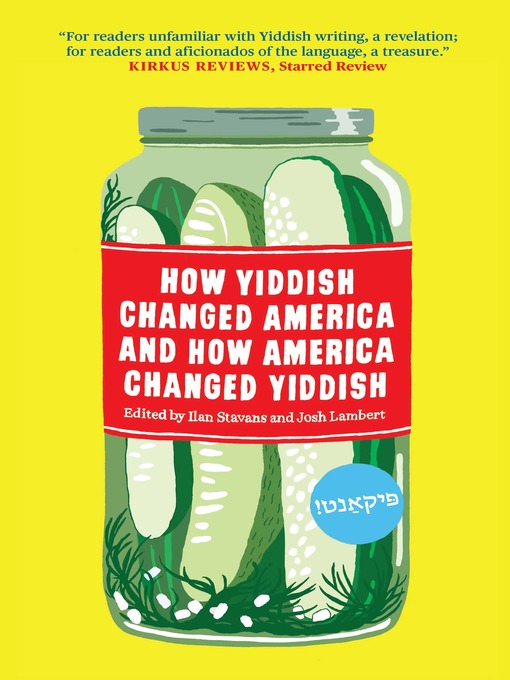A momentous and diverse anthology of the influences and inspirations of Yiddish voices in America—radical, dangerous, and seductive, but also sweet, generous, and full of life—edited by award-winning authors and scholars Ilan Stavans and Josh Lambert.
Is it possible to conceive of the American diet without bagels? Or Star Trek without Mr. Spock? Are the creatures in Maurice Sendak's Where the Wild Things Are based on Holocaust survivors? And how has Yiddish, a language without a country, influenced Hollywood? These and other questions are explored in this stunning and rich anthology of the interplay of Yiddish and American culture, edited by award-winning authors and scholars Ilan Stavans and Josh Lambert.
It starts with the arrival of Ashkenazi immigrants to New York City's Lower East Side and follows Yiddish as it moves into Hollywood, Broadway, literature, politics, and resistance. We take deep dives into cuisine, language, popular culture, and even Yiddish in the other Americas, including Canada, Argentina, Cuba, Mexico, and Colombia. The book presents a bountiful menu of genres: essays, memoir, song, letters, poems, recipes, cartoons, conversations, and much more. Authors include Nobel Prize–winner Isaac Bashevis Singer and luminaries such as Grace Paley, Cynthia Ozick, Chaim Grade, Michael Chabon, Abraham Cahan, Sophie Tucker, Blume Lempel, Irving Howe, Paula Vogel, and Liana Finck.
Readers will laugh and cry as they delve into personal stories of assimilation and learn about people from a diverse variety of backgrounds, Jewish and not, who have made the language their own. The Yiddish saying states: Der mentsh trakht un got lakht. Man plans and God laughs. How Yiddish Changed America and How America Changed Yiddish illustrates how those plans are full of zest, dignity, and tremendous humanity. Most of all, the book shows us that Yiddish, far from being an endangered language, is more vibrant than ever.
Praise for How Yiddish Changed America and How America Changed Yiddish:
"A wide-ranging, eclectic anthology of work by Yiddish writers. Stavans and Yiddish Book Center academic director Lambert have assembled an impressive collection of essays, fiction, drama, memoir, poetry, cartoons, and interviews, all showing how 'Yiddish is so deeply woven into the fabric of the United States that it can sometimes be difficult to recognize how much it has transformed the world we live in today.'... Among all these are some stunners—e.g., 'Oedipus in Brooklyn,' a story by Blume Lempel (1907-1999) that begins with the line, 'Sylvia was no Jocasta.' Emma Goldman (1869-1940) writes fiercely about marriage, which she compares to an 'iron yoke.' In a poem about Coney Island, Victor Packer (1897-1958) writes, 'Beauty and crudity / Go hand in hand and / Launch a united front / Right there are on the sand.' [Cynthia] Ozick (b. 1928) compares Sholem Aleichem to Dickens, Twain, and Will Rogers. 'He was a popular presence, and stupendously so. His lectures and readings were mobbed; he was a household friend; he was cherished as a family valuable.' For readers unfamiliar with Yiddish writing, a revelation; for readers and aficionados of the language, a treasure."
—Kirkus Reviews, Starred Review
"For many people, this will be a poignant, surprising, and engrossing introduction to the epic survival story of a singular culture, requiring no foreknowledge of Yiddish, by two of the field's luminaries. For those of us whose grandparents spoke and understood, and whose parents only understood—no need to explain that we do neither—this book is the way back to a...
- Historical Fiction
- Mystery
- Short Stories
- Fiction eBooks
- Most Popular
- Humor
- See all fiction ebooks collections
- Biography & Memoir
- History
- Religion & Spirituality
- Nonfiction eBooks
- Jewish History
- See all nonfiction ebooks collections
- All Fiction
- All Nonfiction
- Biography & Memoir
- History
- Historical Fiction
- Audiobooks
- All Audiobooks
- Jewish Thought and Practice
- See all audiobooks collections


